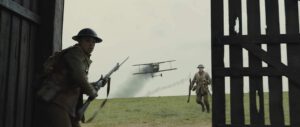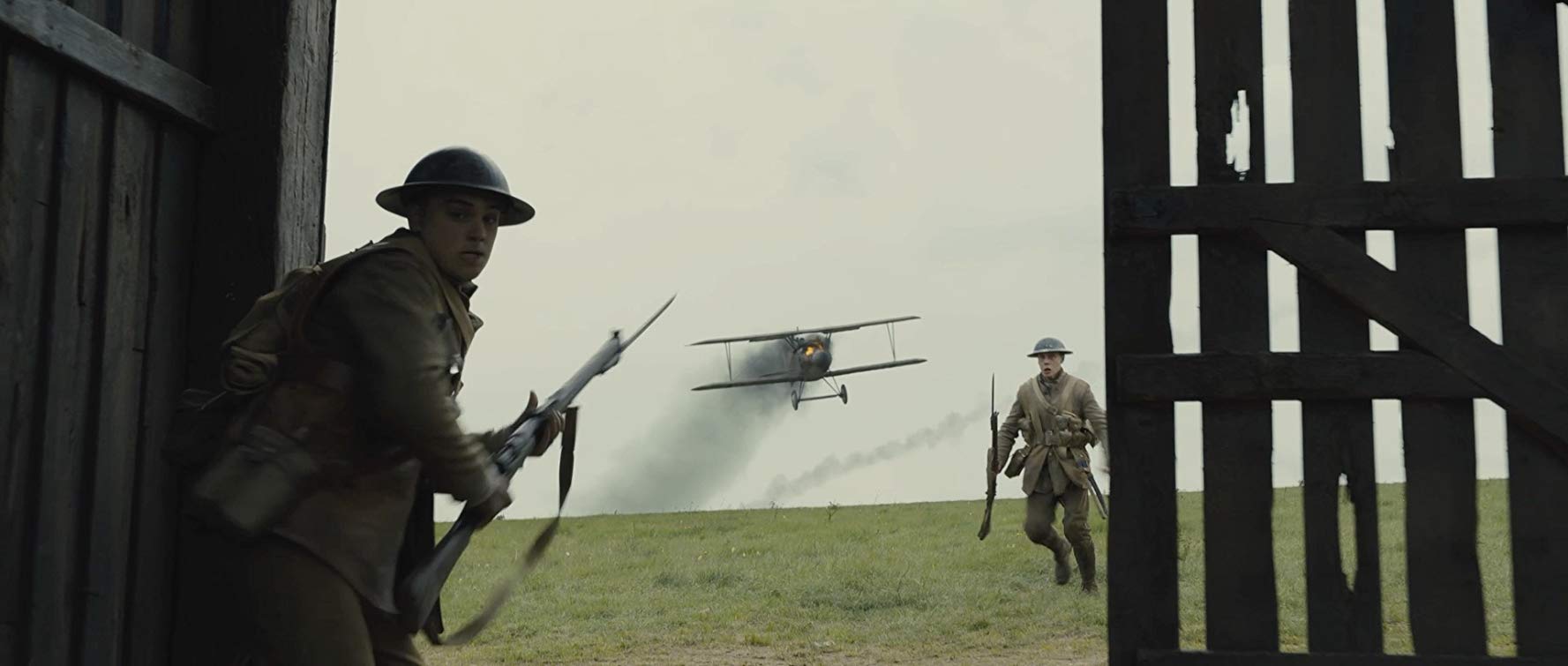Movie Info
Movie Info
- Director
- Sam Mendes
- Run Time
- 1 hour and 59 minutes
- Rating
- R
VP Content Ratings
- Violence
- 5/10
- Language
- 1/10
- Sex & Nudity
- 0/10
- Star Rating
Relevant Quotes
Her cities have become an object of horror, a land of drought and a desert, a land in which no one lives, and through which no mortal passes
Again I saw that under the sun the race is not to the swift, nor the battle to the strong, nor bread to the wise, nor riches to the intelligent, nor favor to the skillful; but time and chance happen to them all.

The action in most WW 1 films is confined to the trenches, but Sam Mendes epic is a journey film—one of just 9 miles, but given the obstacles, the trek couldn’t be more difficult and harrowing if it were 900. It is a race against time, and the stakes are high. Some 1600 British soldiers are about to fall into a carefully planned trap, unless…
Two British lance corporals are the “unless.” The Germans have unexpectedly pulled back from their entrenchments, seemingly in retreat. However, aerial photographs reveal that they are preparing their forces to annihilate any British force that ventures into the area. Because the Germans have cut their phone lines, General Erinmore (Colin Firth) has chosen Blake (Dean-Charles Chapman) to deliver his message to Col. Mackenzie (Benedict Cumberbatch), commander of the 2nd battalion, to call off the attack that has been planned to start within 24 hours. He chooses this particular soldier because he will be motivated to persevere, Blake being the brother of a lieutenant in that batalion. The General quotes Rudyard Kipling, “Down to Gehenna or up to the Throne, He travels the fastest who travels alone.”
Despite this, the Corporal has been allowed to choose a companion, the reluctant Schofield (George MacKay), who would much rather stay behind in the relative safety of their muddy trench. Their journey requires that they venture through the corpse-strewn and barb-wired No Man’s, then traverse the deserted territory once occupied by the enemy, who have no doubt left behind booby traps to kill the unwary. An occasional artillery shell explodes near them. Schofield shows his reluctance by his complaints and desire at one point to hunker down and wait until darkness when it will be safer to travel. His cynicism emerges in his story of how he traded his combat medal to a Frenchman for a bottle of wine. The more idealistic Blake is astonished at his description of the award as “just a piece of tin” and a ribbon.
The crater-ravished land that they travel through, amidst occasional blasts from cannon shells, resembles the cities of Babylon that the prophet Jeremiah describes. All the trees have been shredded of their branches, only their blackened trunks standing. Strewn about are the corpses of dead horses, and then we spot the ruined bodies of soldiers, and pieces of them. A skeleton-like face of a half-buried soldier stares at them from the wall of a crater. When they drop down behind a mound of dirt, Schofield is horrified when his hand cut by barbed wire passes into the decayed chest of a dead soldier beside him. He hurriedly pulls it out, and it is covered with rotting goo. This will not be a journey for the faint-hearted!
When they arrive at and start searching the German trench, their bayonet-equipped guns held at ready, they are relieved to learn that the report is true, the Germans have retreated. Exploring the elaborate redoubt, they are astonished at how much better built and equipped the German fortifications are than their own. Earlier we had seen that hundreds of British Tommies crouch in their trenches trying to sleep, their only shelter being a muddy tarp or blanket. The Germans have underground dormitories equipped with beds! But there is also a trip wire, and before Schofield can act on Blake’s warning, one of the large rats scampers across it, triggering an explosion that buries the Tommy beneath a pile of rubble. Blake manages to dig the unconscious man out and then help him through the tunnels as the roof begins to collapse, the two barely escaping in time.
Another brush with death involves a German plane shot down by British airmen. The two messengers have been exploring an abandoned farm, its house and barn heavily damaged. The German farmers have left behind a cow, apparently recently, as Blake discovers a bucket full of milk. It is still good, so he fills his empty canteen—his water had been used to wash the dust and dirt from Schofield’s face. (This will prove to be providential later on in the adventure.) The burning plane crashes into the barn, narrowly missing the two soldiers. Seeing that the pilot is trapped, the Tommies struggle with his straps and manage to extricate him, with his pant-leg still afire. This merciful act will dramatically affect the nature of their journey!
There follows a dangerous crossing of a collapsed bridge while a sniper fires away; an encounter with a young woman refugee and a baby; a knife fight; a chase by German soldiers firing away at the pursued; and a plunge into a raging river and a waterfall.
The night scene amidst the ruins of a bombed-out city is especially eerie. The darkness is lit up by unput out fires and the blazing light of rocket flares. The shadows cast by the walls that remain standing move according to the position of the flares drifting overhead, thus seeming menacing, the lighting as bizarre as Bosch’s painting “The Harrowing of Hell.”
Much has been made of the cinematography of Roger Deakins, who seemingly films the events in one long take so as to emphasize the continuity of the journey. This is indeed quite a feat, any joining together cleverly hidden by the occasional blackouts that climax a scene. Equally impressive is the amount of detail packed into each shot as we follow the two messengers making their way through the crowded trenches. A second or two of screen time shows us what would take several written pages to describe—exhausted soldiers asleep as they squat against the walls; soldiers cooking over a fire; some eating and drinking; a few talking; many rushing about on errands. But far more impressive to me is something that many reviewers skip over, the singing of the haunting song “Wayfaring Stranger” right before the cliff-hanging climax of the film. We hear the singer before we see him amidst a group of Tommies resting in a wood, their backs against the tree trunks. The singer lifts their vision to the “bright land” to which he is traveling, where “there is no sickness, no toil, no danger.” We think of the incredible “toils and dangers” which our messenger has endured, as well as those which these soldiers will face when the signal to attack is given. Although I must have heard it before, the second verse especially took on meaning after seeing what Blake and Schofield had experienced:
“I know dark clouds will gather ’round me,
I know my way is hard and steep.
But beauteous fields arise before me,
Where God’s redeemed, their vigils keep.
I’m goin’ there to see my mother.
She said she’d meet me when I come.”
Schofield pauses long enough to hear the song, and then continues on, his mission now narrowed down to finding Col. Mackenzie. Where is he in the midst of all the maze of trenches and men getting ready to mount the ill-fated attack? It is now daylight, the hour to rise out of the trenches at hand. And if and when he should find the officer, can he convince the man his orders do indeed come from the General? (As the corporals were preparing to leave, an officer had cautioned them to be sure that there is a witness to their handing over the letter because the Colonel loves attack.)
This is one of those films that rises far above its entertainment value to reflect upon what we are doing when we send forth our young men to make war upon other young men. The skill of the filmmakers makes us feel as if we are in the midst of the action, wondering what we would do were we in the men’s muddied uniforms and faced with such life and death situations. This will be a film you will long remember.
Note: For four long reviews of other films see the 6-page section of the January 2014 issue of VP entitles “Four Films for the 100th Anniversary of World War I. The films are The Big Parade; A Very Long Engagement; War Horse; and Gallipoli—each with a set of discussion questions.
This review will be in the February issue of VP along with a set of questions for reflection and/or discussion. If you have found reviews on this site helpful, please consider purchasing a subscription or individual issue in The Store.

